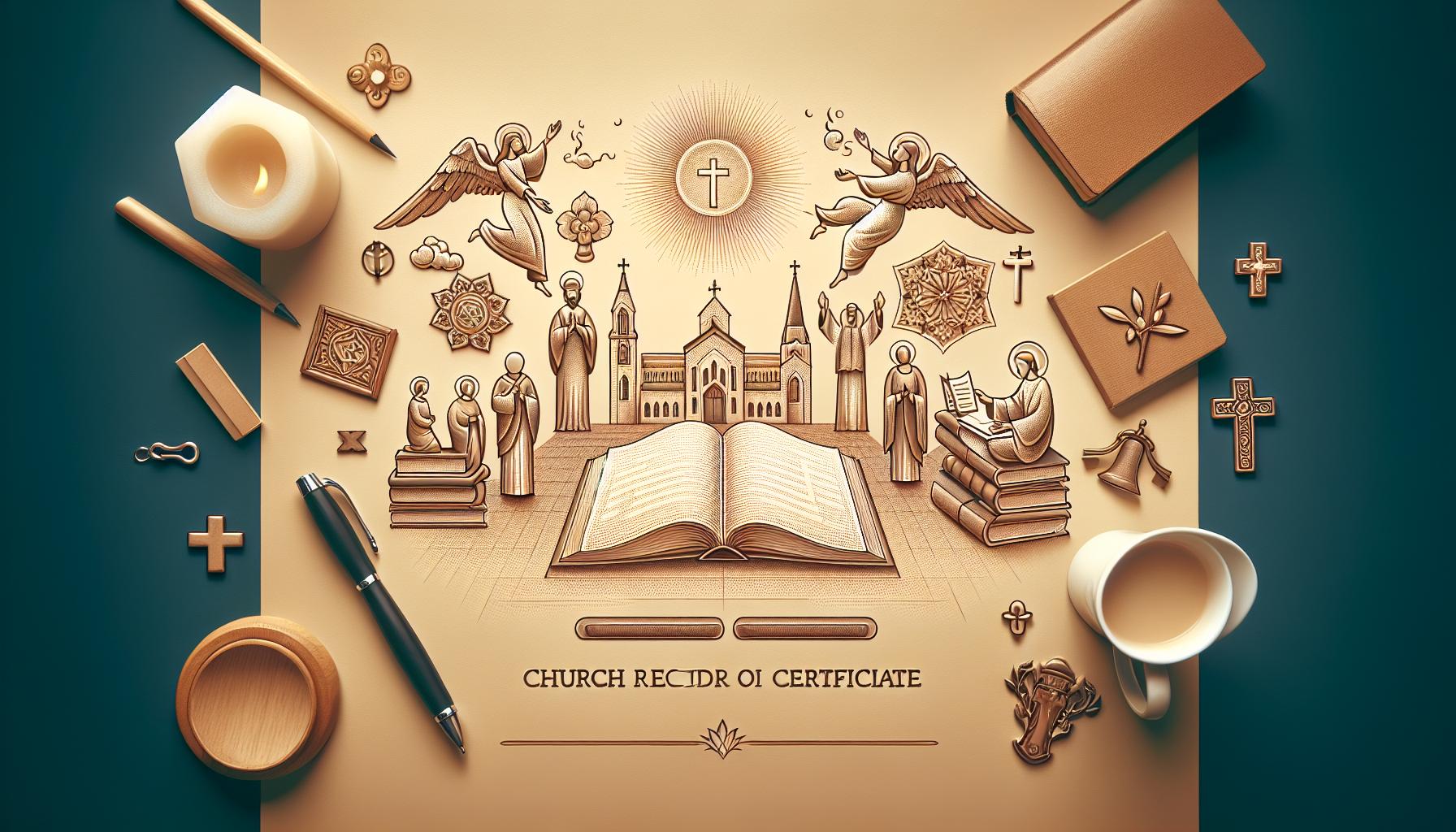Need a baptism certificate but unsure where to begin? Navigating the process can be confusing, yet it’s crucial for many life events and religious milestones. This guide provides fast solutions and valuable tips to help you obtain your baptism certificate quickly and efficiently, ensuring you have the documentation you need for your spiritual journey.
Understanding the Importance of Your Baptism Certificate
While the significance of baptism flows deeply through religious traditions, the tangible expression of that milestone—a baptism certificate—holds its own pivotal importance. This document is more than just a piece of paper; it is a formal record of your spiritual journey and a testament to an important rite of passage. Understanding its value can provide you with clarity on why obtaining your baptism certificate is crucial for various life events and religious practices.
The Role of a Baptism Certificate
A baptism certificate serves multiple purposes throughout your life, acting as a key to unlock numerous opportunities:
- Proof of Baptism: This document is essential when verifying your baptism. Some churches require it for participation in sacraments or rites of passage, such as confirmation or marriage.
- Religious Affiliation: When moving or seeking a new church, your baptism certificate can facilitate your acceptance into a new congregation, helping to confirm your identity as a member of the faith.
- Family Heritage: For many, baptism is a cherished family tradition. Your certificate may be significant for future generations, serving as a link to family heritage.
Why You Need to Retrieve Your Certificate Promptly
When considering how to get your baptism certificate, it’s advisable to act swiftly. Here are several scenarios where having this document readily available is essential:
| Scenario | Importance |
|---|---|
| Getting Married | Many churches require proof of baptism to facilitate a sacramental marriage. |
| Child Baptism | To baptize your own children, you may need to present your certificate as proof of your own baptism. |
| Moving Churches | A new church may require your baptism credentials to formally recognize your faith journey. |
Neglecting to secure your baptism certificate can lead to unnecessary delays in significant life events. Understanding the importance of this document can prompt you to make it a priority. Explore how you can swiftly and efficiently obtain your baptism certificate to avoid any hiccups in your spiritual and personal journey. By being proactive, you ensure that your spiritual path remains uninterrupted, allowing you to engage fully in the rich tapestry of your faith community.
Where to Locate Your Certificate: Church Records and Resources

To acquire your baptism certificate, knowing where to start your search is essential. Many individuals often overlook the crucial role of church records and resources in locating their certificates. Since baptism records are maintained by specific religious organizations, understanding how these systems work can streamline the process significantly.
Understanding Church Records
Church records are often a treasure trove of genealogical information, including baptism certificates. These records are typically held at the place of baptism and can vary based on denomination and location. Familiarizing yourself with the process can help save time and prevent frustration.
- Catholic Churches: Catholic baptism records are typically kept in the parish where the baptism took place. Contact the parish office directly, either via phone or email, and provide necessary details such as your full name, the date of birth, and the approximate date of baptism.
- Protestant Denominations: If you were baptized in a Protestant church, reach out to your former place of worship. Many denominations maintain detailed records of baptisms, though policies can vary widely, so it’s best to inquire directly.
- Online Resources: Some larger denominations may offer online databases where you can request a copy of your baptism certificate. Check the official website of your church or denomination for more information.
Steps to Locate Your Certificate
Navigating church records can feel daunting, but breaking it down into manageable steps can demystify the process.
| Step | Action |
|---|---|
| 1 | Identify the Church |
| 2 | Gather Necessary Information |
| 3 | Contact the Church Office |
| 4 | Request the Certificate |
| 5 | Follow Up if Necessary |
In addition to contacting the church, consider engaging with local historical societies or genealogical groups. These entities often have archives that extend beyond church records and may assist in your search. Don’t hesitate to leverage tools like social media or community bulletin boards to connect with others who have gone through the same process. By methodically navigating these avenues, you’ll increase your chances of obtaining your baptism certificate efficiently.
The Process of Requesting a Copy: Step-by-Step Guidance

Requesting a copy of your baptism certificate can feel daunting, especially if you’re unsure where to start. This vital document not only signifies the sacred event of baptism but also acts as an important record in family histories. Fortunately, the process can be straightforward if you follow a series of clear steps.
Step-by-Step Process
To obtain a copy of your baptism certificate, consider these essential steps:
- Identify the Church: Locate the church where the baptism took place. Most churches keep detailed records, but it’s essential to know which one holds your certificate.
- Gather Necessary Information: Prepare all relevant details, including your full name, date of birth, date of baptism, and the names of your parents or guardians. This information will help church officials quickly find your record.
- Contact the Church: Reach out to the church office via phone or email. Some churches may also have an online request form. Be polite and provide the required details to expedite the process.
- Request a Copy: Specify your request for a baptism certificate. Confirm whether there is a fee involved for processing your request or for mailing the document.
- Follow Up: If you haven’t received a response within the expected timeframe, a follow-up call or email can help keep your request on track.
Understanding Different Scenarios
In some cases, you may not have access to the original church or the church may no longer exist. Here’s what to do:
| Scenario | Action |
|---|---|
| Church No Longer Exists | Check if the records were transferred to a diocese or an archive. |
| Moved to a Different Location | Locate a church in your current area with similar beliefs that may assist in contacting the original church. |
| Invalid or Incomplete Records | Consult the diocese for guidance on how to replicate or verify your baptism through alternative means. |
By following these steps, you’ll be well on your way to obtaining your baptism certificate. Whether it’s for personal records, family history, or other important life events, accessing this document does not have to be a time-consuming process. Through careful planning and communication, you can secure your certificate with ease.
Tips for Quick Retrieval: How to Expedite Your Request
When you find yourself needing a baptism certificate quickly, knowing the right steps to take can make all the difference. Whether it’s for a wedding, confirmation, or another important life event, having the necessary documentation in hand is crucial. Here are several actionable strategies to ensure you can securely and swiftly retrieve your baptism certificate.
Gather Essential Information
Before reaching out to your church or the relevant authority, make sure to compile all necessary details that might be required for a smooth request process. Having the following information on hand can expedite your request significantly:
- Full Name: As listed on the original certificate.
- Date and Place of Baptism: Precise dates and locations can help narrow down records.
- Parents’ Names: Especially your mother’s name, as it may be linked to the church records.
- Your Contact Information: Including your phone number and email address for follow-up inquiries.
Contact the Right Person or Office
Navigating church hierarchies can be complex, but reaching the right individual or office can save you time. Typically, the initial point of contact will be your local parish office. If you’re unsure who to contact, consider the following steps:
- Visit the church’s website to find office hours and contact details.
- Make a phone call for quick inquiries rather than sending emails, as they may take longer to be addressed.
- Request to speak with the church secretary, who can often provide immediate assistance.
Understand the Process and Fees
Different churches may have varying procedures and fees related to issuing baptism certificates. Having a clear understanding of what to expect can reduce delays. Here’s a concise overview of typical practices:
| Church Type | Typical Process | Average Fees |
|---|---|---|
| Catholic | Request in person or by phone; documents are usually issued on the spot or within 1-2 weeks. | $10-$25 |
| Protestant | Some require a formal written request; timeframes can vary by denomination. | $5-$20 |
| Non-denominational | Contact the church directly, usually quick turnaround. | Varies widely |
Being aware of these factors will help you navigate the system more effectively.
Follow Up Promptly
After making your initial request, don’t hesitate to follow up if you haven’t received a confirmation or response within a reasonable time. A polite reminder call or email can accelerate the process. Furthermore, if you need your baptism certificate by a specific date, be sure to communicate that to ensure your needs are prioritized.
By utilizing these strategies, you can confidently expedite your request for a baptism certificate, turning what could be a tedious wait into a streamlined experience.
What to Do If You Can’t Find Your Certificate
If you find yourself unable to locate your baptism certificate, don’t panic. This document, while significant for many religious and personal ceremonies, can often be retrieved through a few straightforward steps. The first recommended action is to contact the church where you were baptized. Most religious institutions maintain records of all baptisms performed, and they can easily produce a copy for you if you provide them with relevant details such as your full name, date of birth, and the approximate date of your baptism.
Steps to Retrieve Your Baptism Certificate
Here are some useful steps to help you navigate this process:
- Gather Information: Compile as much information as possible including your full name, the names of your parents, and the date and location of your baptism.
- Contact the Church: Reach out to the parish or church where your baptism took place. If you cannot remember which church it was, ask family members for assistance.
- Email or Call: If you are unable to visit in person, an email or phone call may suffice. Be sure to check the church’s website for contact details and any specific procedures they may have.
- Follow Up: If you don’t receive a response within a week or two, consider following up to ensure your request is being processed.
In cases where the original church is no longer in operation or if you cannot locate it, pursuing a baptism record through local or regional diocesan offices can be another effective option. They often keep consolidated records of sacraments for multiple parishes. You could also check with the governing body of your religious denomination, as they may provide resources or assistance in finding churches that have records of past baptisms.
Alternative Solutions
If all else fails and you still can’t retrieve the certificate, consider creating a custom baptismal certificate as an alternative proof of your baptism. Using online templates allows you to include essential information such as your name, baptism date, and the name of the officiating priest. Websites like Canva and Creative Certificates offer free customizable templates that cater to various styles and preferences[[1]](https://www.canva.com/certificates/templates/baptismal/) [[3]](https://www.creativecertificates.com/baptism-certificate/). Just remember, these won’t replace an official document but can serve as a temporary solution.
It’s essential to remain patient during this process, as retrieving religious documents can take time. By taking these actionable steps, you can efficiently navigate the challenge of obtaining your baptism certificate.
Alternative Documentation: Proving Your Baptism in Different Ways
Consider a moment when you were asked for proof of your baptism, perhaps for a school application or joining a new church community. This scenario often leads individuals to a common question: “How do I get my baptism certificate?” However, securing the physical document can be challenging, especially if records are lost or the church you were baptized in no longer exists. Fortunately, there are alternative ways to demonstrate your baptism that don’t always rely on having a formal certificate in hand.
Other Forms of Evidence
If you find yourself without your baptism certificate, don’t fret; there are several alternative documentation methods to prove your baptism, including:
- Affidavit for Baptism: You can create a sworn statement outlining the details of your baptism, including the date, location, and the name of the officiant. This affidavit could be notarized to add credibility.
- Church Records: Many churches maintain logs or registers for their members. Contacting the church directly may yield a copy of the record that indicates your baptismal status.
- Testimony from Officiants: If you were baptized by someone well-known in your church community, a written letter or a personal testimony from them could serve as proof.
- Witness Statements: If friends or family members were present during your baptism, having them write brief statements confirming your baptism details can be helpful.
Online Baptismal Records
In today’s digital age, many churches are digitizing their records. Here’s how to leverage online resources to verify your baptism:
| Step | Description |
|---|---|
| 1 | Visit the church’s website. |
| 2 | Check for a member’s portal or archive section where records may be stored. |
| 3 | Contact the church office via email or phone if records are not available online. |
| 4 | Request a digital copy or a confirmation of your baptism. |
Understanding how to navigate the documentation process for your baptism can empower you to provide the necessary proof without undue stress. Whether you’re leveraging witness statements, affidavits, or even online resources, these alternatives can effectively substitute for an official baptism certificate and serve your purpose in proving this significant milestone in your spiritual journey.
Exploring Digital Options: Accessing Certificates Online
To navigate the modern world, accessing important documents like a baptism certificate has become increasingly straightforward, thanks to digital advancements. Many religious institutions now offer online services that allow individuals to request and receive their certificates with just a few clicks. This expansion into digital options not only saves time but also enhances convenience, making the process accessible from anywhere, at any time.
Understanding Online Access to Your Baptism Certificate
When looking to obtain your baptism certificate online, it’s essential to start with the correct website for your religious institution. Many churches and denominations have specific portals or links dedicated to this process. In your search for “How Do I Get My Baptism Certificate? Fast Solutions and Helpful Tips,” you’ll often find that institutions provide step-by-step guides tailored to their procedures, which may include:
- Filling out an online request form with your personal details.
- Providing proof of identity or affiliation with the church.
- Paying any associated fees using secure online payment options.
It’s crucial to gather any necessary information beforehand, such as the date of your baptism, your full name at that time, and possibly your parent’s details, as some churches require additional verification.
Advantages of Digital Requests
One of the significant benefits of opting for a digital approach is speed. Instead of waiting for mail correspondence or making in-person visits, many institutions promise expedited services for online requests. Whether it’s accessing your baptism certificate urgently for a marriage application or a school enrollment, digital requests can often be fulfilled within days. Some organizations even offer electronic copies that you can print at home, ensuring that you have immediate access to your documents.
To give you an idea of the potential costs and processing times, here’s a simple overview of what you might expect:
| Type of Request | Average Cost | Processing Time |
|---|---|---|
| Standard Certificate Request | $10 – $30 | 3 – 5 business days |
| Expedited Service | $30 – $50 | 1 – 2 business days |
Remember, the specifics can vary widely depending on your denomination and local church policies, so it’s wise to verify all details directly with your institution. Embracing online tools can transform what once was a cumbersome process into a hassle-free experience, turning the question of “How Do I Get My Baptism Certificate?” into a prompt and easy solution.
Navigating Different Denominations: A Guide to Varying Practices and Procedures
In the journey of faith, understanding baptism practices across different denominations can significantly influence how individuals seek their baptism certificates and the procedures involved. Various Christian denominations, like Catholicism, Protestantism, and Orthodoxy, have unique traditions and requirements for baptism, which, in turn, affect how and when a baptism certificate is issued. This diversity can sometimes create confusion for those asking, “How Do I Get My Baptism Certificate? Fast Solutions and Helpful Tips.”
Understanding Denominational Differences
Each denomination has distinct beliefs and practices regarding baptism. For instance, in the Catholic Church, baptism is considered a sacrament that is essential for salvation. Hence, records are meticulously maintained, and individuals can usually obtain their baptism certificate directly from the parish where the baptism took place. In contrast, many Protestant denominations emphasize personal faith and may not require a formal baptism certificate, making the process more informal. However, churches often keep records, and requesting a certificate usually involves contacting the specific congregation.
- Catholic Churches: Certificates are issued by the parish; request typically involves filling out a form with details of the baptism.
- Protestant Churches: Contacting the church office is generally sufficient; they may have varying procedures based on the congregation.
- Orthodox Churches: Similar to Catholicism, baptism is a significant sacrament, and records are well-kept by the parish.
Steps to Obtain Your Baptism Certificate
Knowing how to navigate these practices can streamline the certificate retrieval process. Here are some practical steps to follow based on denominational practices:
| Denomination | Steps to Request Certificate |
|---|---|
| Catholic | Contact your parish office, provide baptism details, and complete any necessary forms. |
| Protestant | Reach out to the church office; procedures will vary by congregation. |
| Orthodox | Visit the local church and speak with the priest about obtaining your records. |
It’s essential to have details like the date of baptism, names of those involved, and the parish’s location. In cases where the baptism occurred many years ago or in a different location, some churches may require additional verification, which can take extra time. Understanding these differences and the steps involved can help ensure a smoother process as you seek your baptism certificate, aligning with the various practices across denominations.
FAQ
How do I get my baptism certificate?
To obtain your baptism certificate, contact the church or religious organization where you were baptized. Each institution may have specific procedures; however, generally, you may need to provide your name, baptism date, and possibly proof of identity.
Be prepared to fill out a request form and possibly pay a fee. If you’re unsure where to start, visiting the church’s website can provide additional resources or contact information for your inquiry. You can find more details on baptism records that might help.
What is a baptism certificate, and why do I need one?
A baptism certificate is a formal document that confirms an individual’s baptism in a particular church. It may be required for various reasons, such as applying for a wedding in a religious context, enrollment in religious education, or simply for personal record-keeping.
This document serves as evidence of your participation in this sacred tradition and is respected across many denominations. If you’re not sure how to proceed, consider discussing this with your local clergy for more guidance.
Can I get a copy of my baptism certificate online?
Many churches provide online services to request a baptism certificate. Check the official website of the church where you were baptized for any online forms or payment options.
If the church doesn’t have a digital system, calling or emailing them can often lead to faster solutions. Ensure you have all necessary information, including your full name and baptism date, at hand.
What should I do if the church no longer exists?
If the church where you were baptized has closed, it can be challenging to obtain your baptism certificate. First, reach out to nearby churches or the diocese to see if they have any records.
Sometimes, denominations maintain a central record of all baptisms within their jurisdiction. Providing as much information as possible about your baptism will assist in this process.
Why does my baptism certificate matter for marriage?
A baptism certificate often proves your eligibility to marry within many religious traditions, especially if one partner is Catholic. It indicates that you have undergone the sacrament necessary for participating in certain religious ceremonies.
Always check with your church’s officiant, as they may require this document before scheduling your wedding. Knowing this can save you time and ensure a smooth preparation for your special day.
Can I replace a lost baptism certificate?
Yes, you can request a replacement for a lost baptism certificate from the church that performed your baptism. You’ll typically need to fill out a form and provide identification.
Each church has its own policy regarding replacements, so contacting them directly will give you specific instructions. Many churches understand that documents get lost, so they usually have a straightforward process for replacements.
What information is typically included in a baptism certificate?
A baptism certificate generally includes your full name, the date of baptism, the name of the officiant, and the church’s name. Some churches may also provide additional details, such as the names of godparents.
This information is essential for various religious and personal reasons. By understanding these details, you can better prepare for situations where proof of baptism is required.
In Retrospect
In conclusion, obtaining your baptism certificate is an important step in your faith journey that can serve as a symbol of your commitment to your spiritual life and community. Whether you reach out to your local church, consult with denominational databases, or explore state-sanctioned records, you now have the tools and insights to navigate this process effectively. Remember to gather essential documents, communicate clearly with relevant authorities, and be patient as you seek this significant milestone.
We encourage you to reflect on the meaning of your baptism and consider sharing your journey with others. Feel free to engage with our community through comments or inquiries, as your experiences and questions are valuable not just to you but also to others exploring their faith. Let this be an opportunity not only to secure your certificate but to deepen your understanding of the sacred traditions that bind us all. You’re not alone on this path; join us in celebration of faith as we continue to support one another in our spiritual endeavors.





